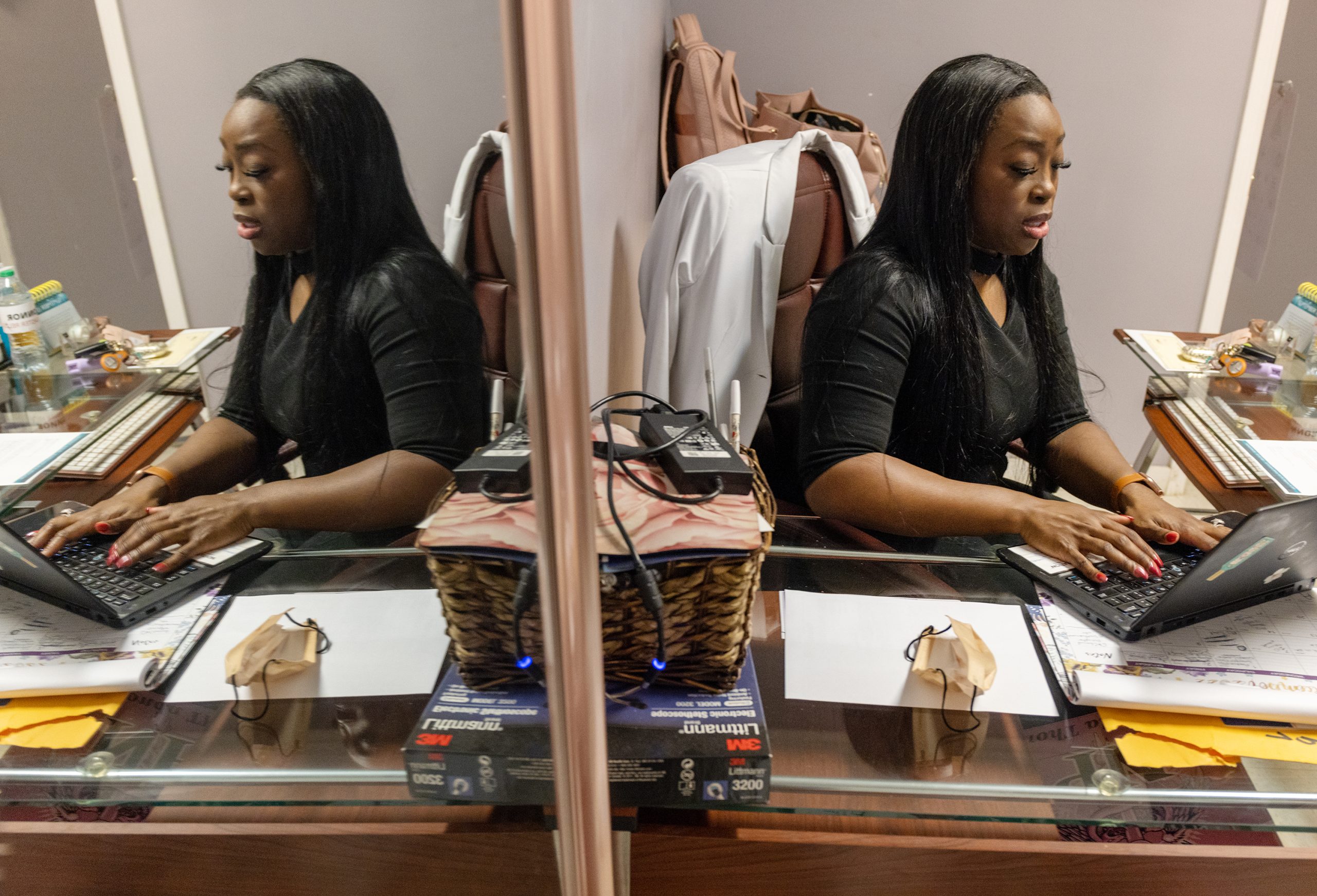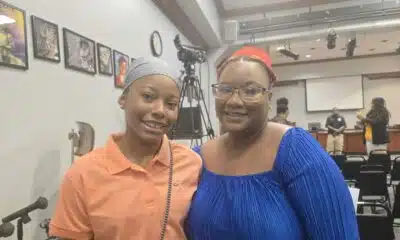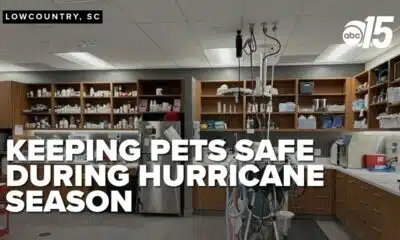Mississippi Today
As health infrastructure shrinks, a daughter of the Delta cares for her community
As health infrastructure shrinks, a daughter of the Delta cares for her community
To reach Gunnison, Mississippi, from Cleveland, the quickest path – though not the route with the best-paved streets – takes you off Highway 8, down miles of narrow roads slicing through some of the most fertile land on earth. In early December, the fields are still but not empty. Silvery water pools in gashes in the dirt, and cardinals settle on shoots of electric green gleaming in the gray light of winter.
When you reach Highway 1, you’ve arrived in Gunnison, with a population of 425 and only two businesses: a gas station and Healthy Living Family Medical Clinic, opened by Gunnison native Wyconda Thomas in 2019. The squat brick building is decorated for the season, with a wreath on the door and letters out front spelling “Merry Christmas.”
When Thomas decided to open her own practice, she chose the place where she saw the greatest need, which also happened to be the community that raised her.
Despite the town’s small population, the clinic is full every day.
“The statistics– it pointed to these areas,” Thomas said. “The Delta, the lack of resources– if you look at who suffers the most, it’s always these areas. That’s the place you should be treating.”
No region of the state has been harder hit by the decimation of Mississippi’s health infrastructure than the Delta. Kings Daughters Hospital in Greenville closed in 2005, and Patient’s Choice Medical Center in Belzoni followed in 2013. Now, Greenwood-Leflore Hospital is scrambling to find funding to stay open through the legislative session, when it hopes to persuade lawmakers to help.
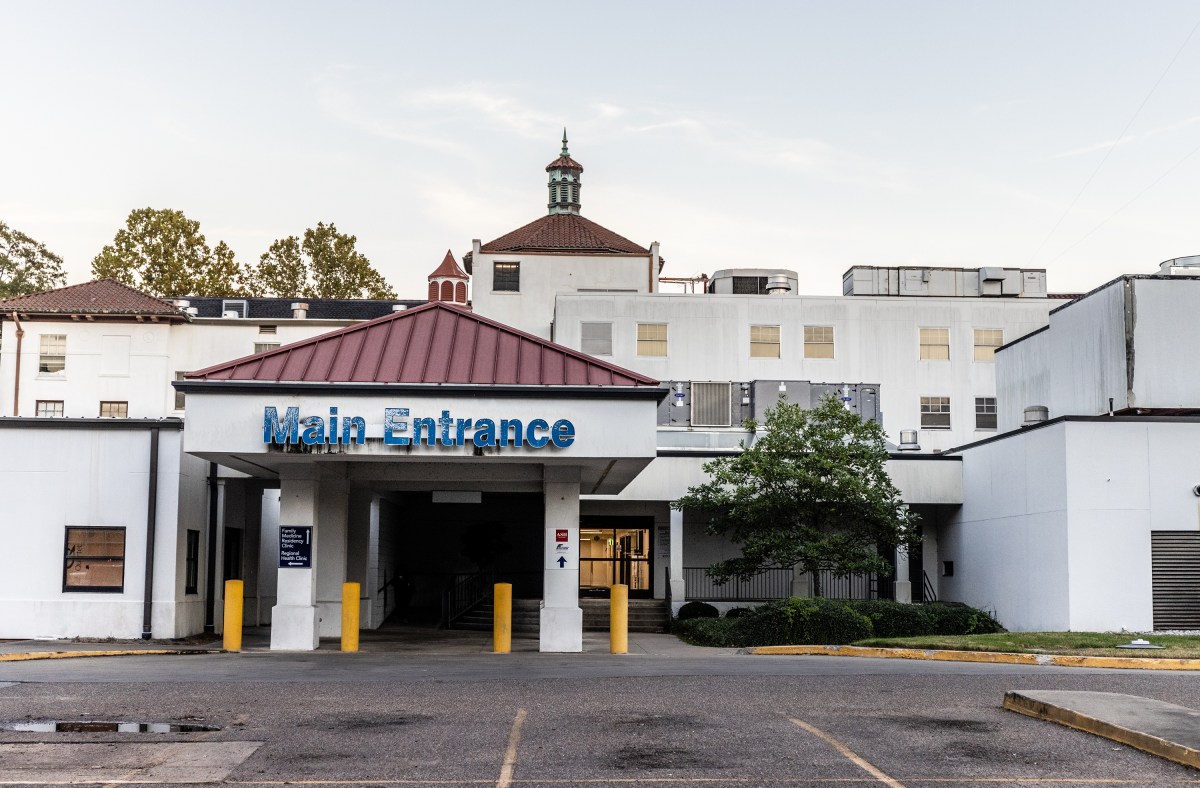
Even if the money comes through, there is no long-term plan to ensure Delta residents have access to health care. The predominantly Black region is one of the poorest in the country, and like the state as a whole, it has high rates of diabetes, hypertension and heart disease.Earlier this year, state health officer Dr. Daniel Edney said the region’s health infrastructure is “very fragile” and six Delta hospitals are at risk of closure.
“No one’s coming to the rescue,” he said.
No one, that is, except for Thomas and people like her: Delta natives who have chosen to open their own small clinics close to home. People like Mary Williams, who runs Urgent and Primary Care of Clarksdale; Juliet Thomas, Antoinette Roby and Desiree Norwood of the mobile clinic Plan A; and Nora Gough-Davis, who operates clinics in Shaw and Drew.
They face policies that seem almost designed to punish them for trying. Nurse practitioners are reimbursed by Medicaid just 85% of what physicians receive for providing the same services. State regulations require them to have a collaborating physician, to whom they must pay a monthly fee that can reach over $1,000. The state’s failure to expand Medicaid means more of their patients lack insurance, and they may never see a penny for treating them.
“You have to give yourself,” said Gough-Davis, who trained Thomas and 25 other Delta nurse practitioners at her clinics. “It’s really like community service. We have patients with low, low health literacy. So our typical visit is going to require much more education than a visit with someone who doesn’t have health literacy issues. Education takes time.”
And payment structures don’t account for that time.
“It never comes close” to full compensation, Gough-Davis said of the typical reimbursement.
Owning her own practice, Thomas has had to learn how to handle paperwork and billing and dealing with reimbursement from Medicaid and insurance companies. She works from 8 a.m. to 6 p.m. most days, and spends weekends and evenings attending trainings and seminars. She sees everything from the flu and COVID-19 to anxiety and depression to birth control requests.
WIth the health department presence in Bolivar County shrinking and hospitals closing, clinics like Healthy Living are under pressure.
“The struggles are there,” she said. “Everything is being put onto family practice now.”
And yet Thomas struggles to imagine working anywhere else.
“The people here get me and I get them,” she said. “It’s rewarding to make a difference and to do this. I feel like I have God’s favor because of that.”
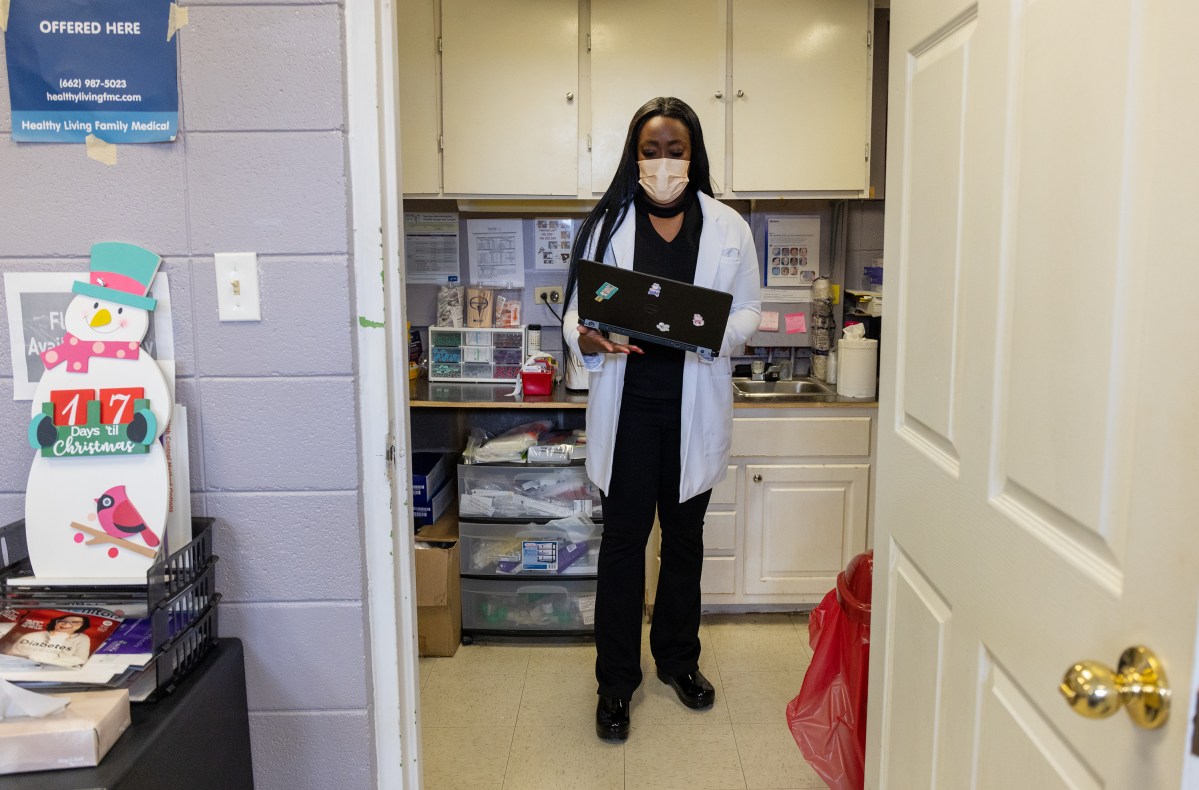
‘A personal connection to her patients’
Just before 9 a.m. on a recent Thursday, Thomas prepared to see her first patient of the day: a 3-year-old boy at the clinic for a well-child exam.
She wore black scrubs, with a matching scarf and shiny shoes, and a tidy red manicure. The clinic’s rooms radiated the same warmth and cheerful competence that she did: In the lobby, posters advertise free sports physicals and family planning services. A Christmas tree was decorated with hot pink ornaments.
Clutching a clipboard, Thomas walked into the first exam room to see her patient, accompanied by his mom and grandfather.
“Come on, hop up here,” she said to him, gesturing to the table. “I think he might need some help.”
She lifted him up and he sat calmly on the table, his hands folded in his lap and his sneaker-clad feet dangling several feet off the floor.
Thomas told his family that he needed to be in a booster seat and wearing a helmet when riding a bike. She confirmed he had recently seen a dentist, and would need a vision screen today.
“How’s his diet?” Thomas asked. “Does he eat a lot of foods like rice, cereal, cheeseburgers?”
“That’s about the only thing he’ll eat,” his mom answered.
Thomas laughed. She checked the boy’s ears. He gazed calmly around the room, never fidgeting or whining.
“You such a good little patient!” she exclaimed.
She told his family that he had some fluid in his ears, so she would send a prescription over to their pharmacy.
Then her time with the boy was over. The visit hadn’t been complicated, but Thomas had been able to confirm the 3-year-old was healthy and growing well, and his vision was good – a particularly important finding as he approached kindergarten, which most Mississippi kids reach without ever having had a developmental screening.
A few hours later, a 57-year-old woman named Arlesia Mobley sat in a different exam room. She complained of a headache and dizziness.
“Been around anybody sick?” Thomas asked.
“My grandbaby,” Mobley said. “She had the flu.”
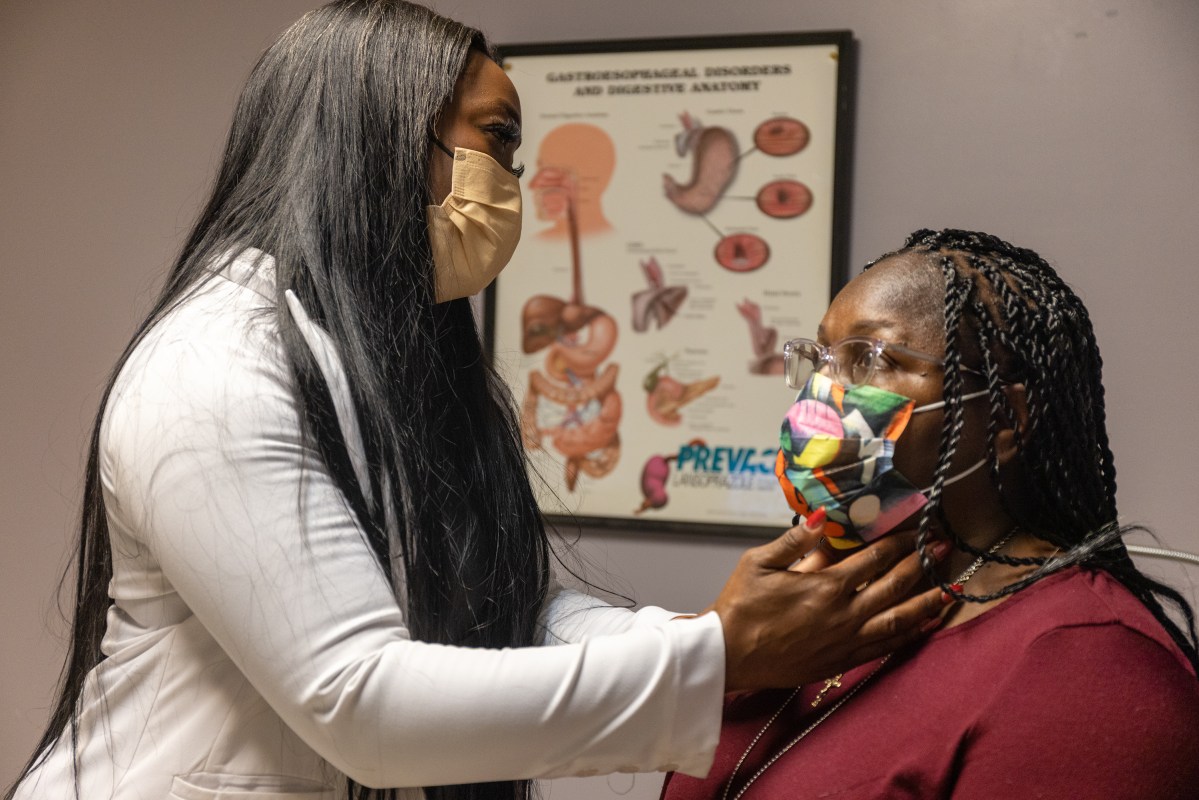
Thomas checked her ears and saw fluid, which she explained was probably causing Mobley’s dizziness. She asked a nurse to conduct a flu swab but went ahead and ordered Tamiflu for her patient. She advised her to drink plenty of fluids, eat chicken noodle soup, and rest as much as possible.
A few days later, Mobley said she was feeling better, but still drained.
She had had to find a new doctor earlier this year because of her insurance. She lives in Rosedale, so Thomas was close by. She already feels like Thomas knows her.
“When she step into the room, she’s got that smile,” Mobley said later. “When she pass by you and you (are) sitting out in the waiting room, she got that smile. That makes me feel good, ‘cause I mean most doctors… especially in the waiting room, their mind wouldn’t be on you nowhere. But it seem like she got a personal connection to her patients.”
Opening a clinic in her hometown
Thomas is a daughter of the Delta, raised in Gunnison and Rosedale. Her parents both coached basketball, and she grew up in the gym. She was a star player at West Bolivar High School and then played for Delta State.
Her mom and dad, both Bolivar County natives, too, had high expectations for their daughter.
“When she was growing up, she couldn’t bring no C’s into my house,” said her mother, Will Ethel Hall. “I don’t want nothing but A’s, but we’ll talk about a B, because you was playing sports and maybe you didn’t get it that way. No C’s were allowed, and she knew that.”
“I was real hard on her,” said her father, Willie Thomas, who coached her at West Bolivar.
A few weeks ago, he ran into a woman in the store who was remembering how he had pushed his daughter. Thomas told her that looking back, he felt it had been too much, and he would do things differently if he could.
“She said, ‘Look how she turned out,’” Thomas said. “I said, ‘You right. I’d do it the same.’”
After college, she spent a year teaching biology before deciding she wanted to go into nursing and going back to school. She knew she’d like to open her own practice eventually, so she made a point of working in as many areas as she could – postpartum care, pediatrics, nursery, neonatal intensive care unit, home health and intensive care.
“You own your own practice in the Delta, you gotta be everything – resources are very, very limited, you know,” she said.
The Greenville NICU where Thomas trained closed earlier this year, leaving the Delta with no NICUs at all.
As soon as Thomas became a nurse practitioner in 2015, she started working on plans to open her own clinic. Her grandfather had owned the little building in Gunnison that had once been a county health facility, and the family left it to her for her business.
When she approached Gunnison leaders about opening a clinic there, they were elated.
“Our area is really underprivileged, and we just needed a clinic here in town to help our citizens,” said Mayor Frances Ward, who has known Thomas since she was born. “A lot of them don’t have transportation, and they had to pay people to carry them to Cleveland to the doctor. It’s really a blessing that she is here. And we’re very proud of her being from Gunnison, to come back and help her fellow people.”
Thomas opened Healthy Living on Jan. 2, 2019.
Gunnison residents like 70-year-old Ruby Hall, who works for Thomas as a nurse at the school-based clinics she runs in Rosedale, can’t recall a doctor or nurse coming back to the town in the last 60 years.
Tina Highsmith, executive director of the Mississippi Association of Nurse Practitioners, said that’s a common trajectory for Mississippians in their field.
“Even though I had moved to several other parts of the state, when I came back to open a clinic it was in my hometown,” she said. “Those NPs have already established relationships… And so the patients know them, they trust them.”
And Thomas knows her patients, often personally as well as through her work. That’s part of what drives her.
Her mother remembers missed lunch appointments because the clinic was so busy, and detours during drives to check up on patients at their homes or drop off medicine.
“It’s just a tie that I have here,” Thomas said. “They need me so bad. At least I feel like they do. That makes me stay here.
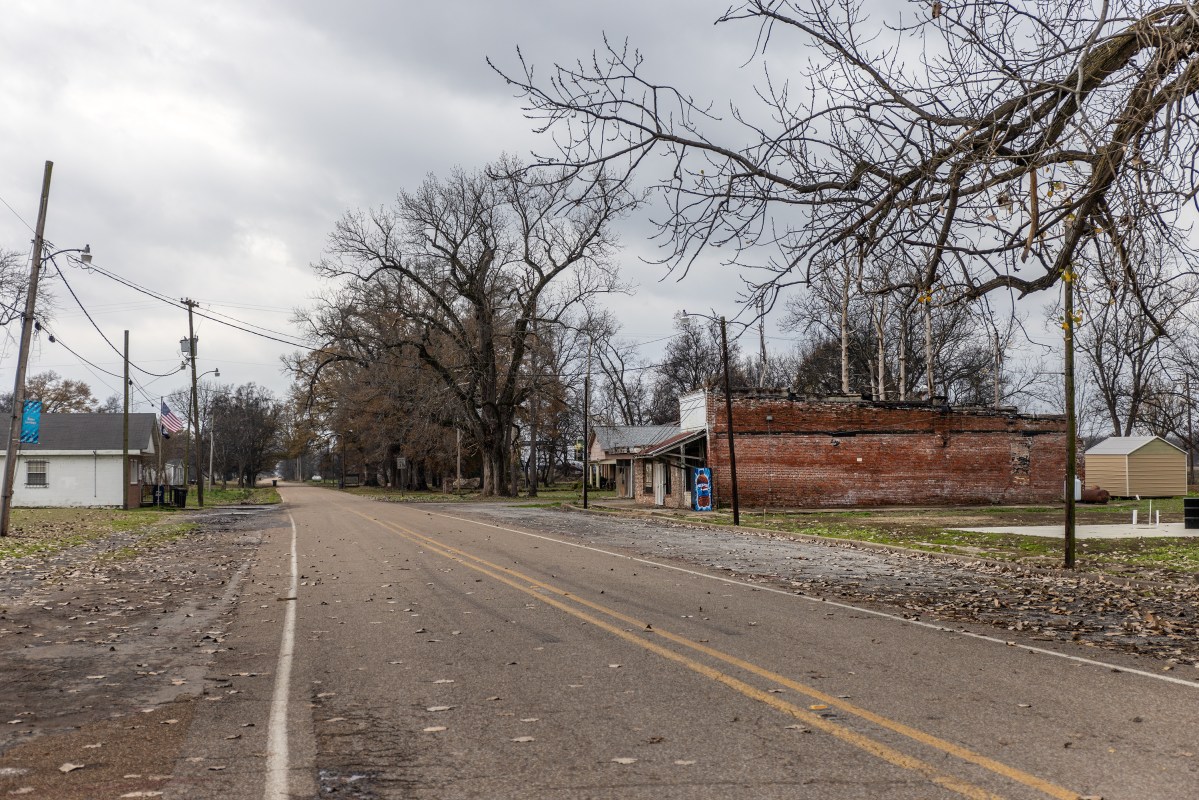
From 13 county health department clinics to one
At the only other business in Gunnison, Bassie’s Service Station, Charlette Brady slices cold cuts, makes sandwiches and rings up bottles of soda and beer.
“Really don’t much go on here,” she said.
The opening of Thomas’s clinic was a rare event. Before, Brady and her children traveled to Cleveland for doctors’ appointments. Now, the whole family goes to Healthy Living.
Inside the lobby of the clinic, a plaque commemorates the building’s history. Preserved in the cinderblock wall, the black sign with silver lettering reads: “Bolivar County Branch Health Center. Gunnison, Mississippi. 1960.”
The plaque also hints at how rural Mississippi’s health care resources have shrunk over the last several decades, because the Gunnison county health department site closed sometime in the 1980s. Before Thomas opened her clinic in 2019, it served as a polling location and a small restaurant before sitting vacant for years.
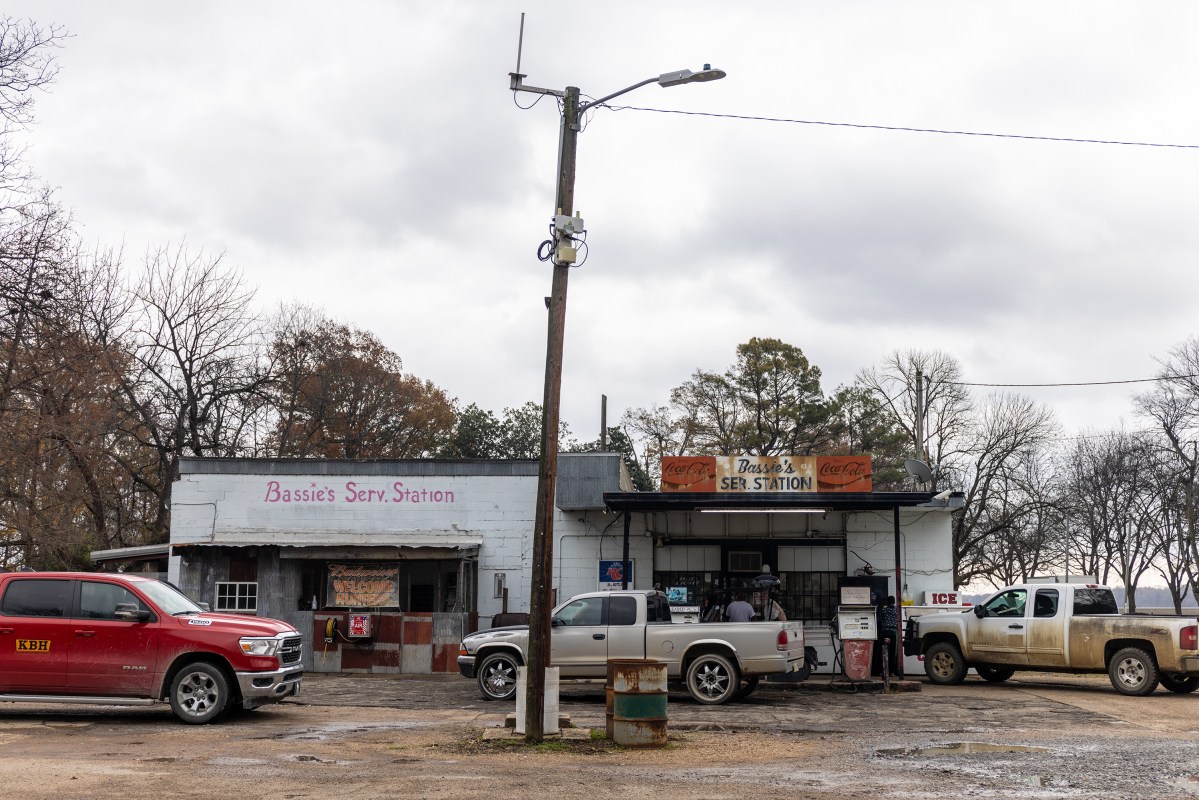
In 1975, Bolivar County boasted 13 satellite clinics in addition to the main county health facility in Cleveland.
“We try, especially in the Cleveland office, to offer general health services every day of the week,” county health officer Dr. Dominic Tumminello, a Gunnison native, told the Clarion-Ledger that year. “When a person walks into our health clinic, we want to serve that person.”
The county health department building in Rosedale, a 10-minute drive away, closed in February 2016, along with eight other such facilities around the state. Today, there is only one county health department site in Bolivar, in Cleveland, and it is open only four days a week, with limited walk-ins and family planning services requiring a call ahead of time.
Rosedale’s pharmacy closed recently, too, when its owner retired.
The nearest hospital is 30 minutes away, in Cleveland.
The Delta’s population is declining and has declined dramatically since 1940– part of the reason why large hospitals built early in the 20th century are struggling.
In Bolivar County, 29% of adults lack health insurance. Thirty-six percent of county residents live in poverty, compared to 20% statewide.
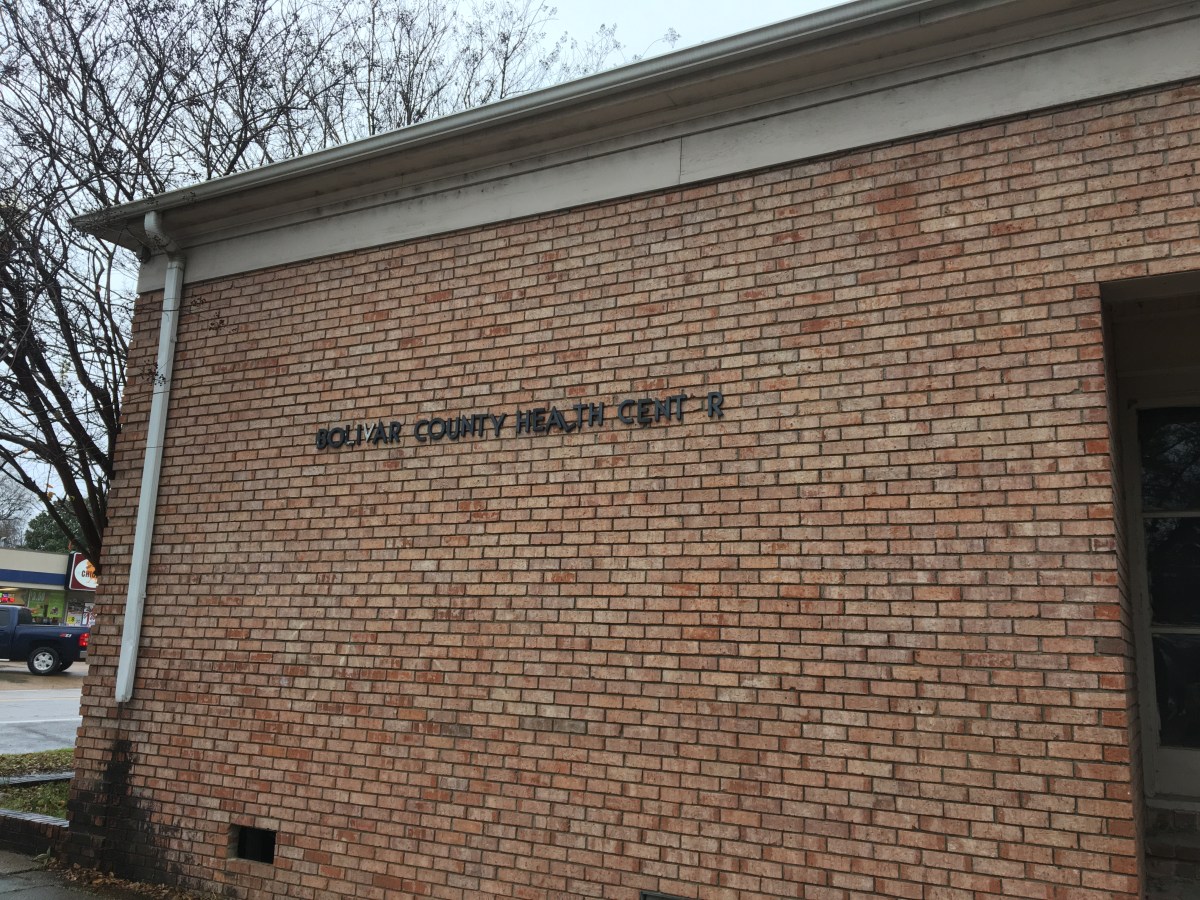
The combination of poverty, lack of insurance, serious health needs and a small, spread-out population makes health care in the Delta a puzzle that is only becoming more complicated.
Yet Thomas has found a way to make it work, by winning federal and state grants that allow her to offer services on a sliding scale, so that patients without insurance can still afford to see her. Healthy Living Family Medical Center was designated a Rural Health Clinic by the health department, which means the federal government reimburses the clinic for primary care services. Thomas also offers family planning services through the Title X grant, participates in a tobacco cessation program through the Institute of Minority Health, and offers free COVID-19 testing and vaccines.
Her husband, Jervis McGee, sees how hard she works, taking calls from patients after hours and reading up on health issues in her free time.
“A lot of people forget that she’s a normal person, too,” he said.
For Thomas, it feels critical to offer as many services as possible to a community that needs them. But it’s also exhausting to participate in so many programs, each with its own paperwork requirements, and to try to develop expertise in so many areas.
She noticed that many of her patients struggle with anxiety and depression, though they don’t always use those labels for their symptoms. She tries to refer them to psychiatrists, but availability is limited. Efforts to bring a psychiatric nurse practitioner to the clinic one day a month or to offer telemedicine haven’t panned out. So now she’s planning to go back to school to earn certification as a psychiatric nurse practitioner.
Nora Gough-Davis, the nurse practitioner and clinic owner who helped train Thomas, said operating an independent family practice clinic is no easy task. After a decade in business, Gough-Davis is hoping to sell the clinics and focus on her work teaching nursing at Delta State. She wants to make sure any buyer keeps them open.
“I’m tired,” she said. “I want to make sure that access doesn’t leave.”
And all around independent family practice owners in the Delta, the walls are closing in, as hospitals flounder and county health departments cut hours and offices.
One of Thomas’s patients that Thursday was a woman named Jennie Usry. Usry has had headaches and memory loss ever since a fall on the job in June, and she needs to see a neurologist. A specialist in Clarksdale didn’t take her insurance. And when she tried to make an appointment at Greenwood Leflore, she told Thomas, it was impossible.
“The hospital closing down, so they not taking new patients,” Usry said. “But you a doctor, so you call, it might be different.”
“I don’t know,” Thomas said. “I don’t know if that will… but I will try.”
(A spokesperson for Greenwood Leflore said the hospital’s neurology clinic is still open and accepting new patients. During negotiations with the University of Mississippi Medical Center, the clinic did not make new appointments because it was unclear whether any deal with UMMC would allow neurology services to continue. Negotiations have ended with no deal and Greenwood Leflore hopes the legislature will approve funding that will allow it to stay open.)
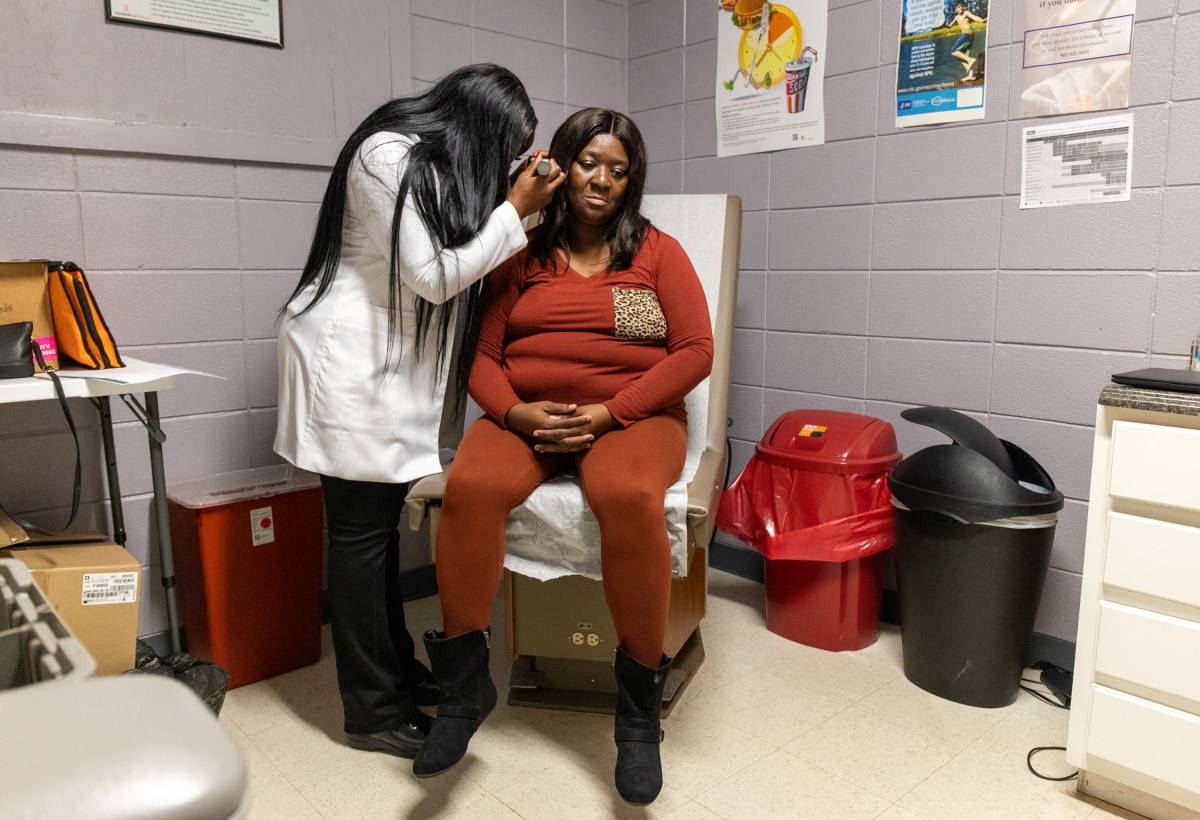
This article first appeared on Mississippi Today and is republished here under a Creative Commons license.
Mississippi Today
‘Will you trust us?’: JPS plan for stricter cellphone policy makes some parents anxious
Superintendent Errick Greene wanted to be very clear with the roughly 50 parents who attended Thursday night’s community listening session: Jackson Public Schools already has a policy banning students from using cellphones at school.
But the leadership of Mississippi’s third-largest school district has decided that a new approach is in order, citing a series of incidents in recent years involving students using their cellphones to bully others, organize fights or text their parents inaccurate information about violence happening at or near their school.
“To be clear, it’s not the majority of our scholars, but I can’t look at a class and know who’s gonna be bullying today, who’s gonna be scheduling a meetup to cut up today,” Greene said toward the end of the hour-long meeting held at the JPS board room. “I can’t look at a group of scholars and say, ‘OK, yeah, you’re the one, let me take your phone, the rest of you can keep it.’”
Under the rewritten policy, students who take their phone out of their backpacks during the instructional day will lose it for five days for the first infraction, 10 days for the second and 45 days for the third. Currently, the longest the school will hold a phone is 10 days.
The Jackson school board is expected to consider the new policy at its meeting next week and the district hopes to implement the change when the new school year starts later this month, said Sherwin Johnson, the district’s communications director.
Students also currently have the option to pay up to a $25 fine to get their phone back, but the district wants to rescind that aspect of the policy.
“We’ve discovered that’s not equitable,” said Larrisa Harris, the JPS general counsel. “Not everybody has the resources to come and pay the fine.”
Support for the new policy among the parents who spoke at the listening session varied, but all had questions. How will students access the internet on their laptops if the WiFi is spotty at their school and they need to use their cellphone hotspot? If students are required to keep their phones in their backpacks during lunch, how will teachers prevent stealing? How will JPS enforce the ban on using cellphones on the bus?
One mother said she watches her daughter’s location while she rides the bus to Jim Hill High School so she knows her daughter made it safely.
“If they can’t have it on the bus, who’s gonna enforce that?” she said. “I’m just gonna be real, the bus driver got to drive.”
A common theme among parents was anxiety at the prospect of losing direct contact with their kids in the event of an emergency. A Pew Research survey found that most adults, regardless of political affiliation, support cellphone bans in middle and high school classes. But those who don’t say it’s because their child can use their phone during emergencies.
“If something happened, will we get an automatic alert to notify us? Because a lot of the time we see things on social media first,” said Ashley McIntyre, a mother of three JPS students. She attended the meeting with her eldest daughter, Aaliyah, who recently graduated from Powell Middle School.
Though JPS does have an alert system for parents, McIntyre said she didn’t know if it existed. She cited a bomb threat at Powell last year that she found out about because Aaliyah texted her, not through a school alert.
“We didn’t know what was going on, and she texted me, ‘Mom, I’m scared,’ so I went up there,” McIntyre said. “So that puts us on edge.”
Aaliyah said she uses her phone to text her mom and watch TikTok, but she feels like her classmates use their phones to be popular or to fit in. When a fight happens, she said many students pull out their phones to record instead of trying to get an adult who can stop it. Then the videos end up on Instagram pages dedicated to posting fights in JPS.
“Once the principal found out about the fight pages, they came around looking inside our videos and camera rolls,” she said. “It happened to me last year. They thought I had a fight on my phone.”
Toward the end of the meeting, Laketia Marshall-Thomas, the assistant superintendent for high schools, took the mic to respond to one parent who said she was concerned that older students would not come to school if they knew their phone could be taken.
“What we have seen is, it’s the older students—” Marshall-Thomas began.
“They are the problem,” someone from the audience chimed in.
“We’re not saying they cannot have them,” she continued. “We know that they have after school activities and they need to communicate with their moms … but we have had major, major issues with cellphones and issues that have even resulted in criminal outcomes for our scholars, but most importantly, our students … have experienced a lot of learning loss.”
While the district leadership did not go into detail about the criminal incidents, several pointed to instances where students have texted their parents inaccurate information, such as an unsubstantiated rumor there was a gun during a fight at Callaway High School or that a shooting outside Whitten Middle School occurred on school property.
“Having phones actually creates far more chaos than they help anyone,” Greene said.
While cellphones have been banned to varying degrees in U.S. schools for decades, youth mental health concerns have renewed interest in more widespread bans across the country. Cellphone and social media usage among school-aged kids is linked to negative mental health outcomes and instances of cyberbullying, research shows.
At least 11 states restrict or ban cellphone use in schools. After Mississippi’s youth mental health task force recommended that all school districts implement policies that limited cellphone and social media usage in classrooms, a bill that would’ve required school boards to create cellphone policies died during the legislative session. Still, several Mississippi school districts have passed their own policies, including Marshall County and Madison County.
Another concern about the ban was a belief among a couple of speakers at the meeting that cellphones can help parents hold the district accountable for misdeeds it may want to hide.
“I just saw a video today. It was not in JPS, but it was a child being yelled at by the teacher and had he not recorded it, his momma would have never known that this sweet lady that they go to church with is degrading her child like that,” one mother said.
Statements like these prompted responses from teachers and other parents who urged the skeptical attendees to be more trusting or to make sure the district has updated contact information for them in case school officials need to reach parents during an emergency.
“I think we have to trust the people watching over our children,” said one of the few fathers who spoke. “When I grew up, what the teacher said was gold.”
One teacher asked the audience, “Will you trust us?”
This article first appeared on Mississippi Today and is republished here under a Creative Commons Attribution-NoDerivatives 4.0 International License.
The post ‘Will you trust us?’: JPS plan for stricter cellphone policy makes some parents anxious appeared first on mississippitoday.org
Note: The following A.I. based commentary is not part of the original article, reproduced above, but is offered in the hopes that it will promote greater media literacy and critical thinking, by making any potential bias more visible to the reader –Staff Editor.
Political Bias Rating: Centrist
The article presents a balanced report on Jackson Public Schools’ proposed stricter cellphone policy without taking a clear ideological stance. It fairly conveys the perspectives of school officials emphasizing discipline and safety, alongside parental concerns about communication and emergency access. The tone remains neutral, focusing on factual details such as policy changes, reasons behind them, and community reactions. While it includes some skepticism from parents and responses from district staff, the language does not endorse or oppose either side. Overall, the coverage adheres to neutral, factual reporting by presenting multiple viewpoints without editorializing.
Mississippi Today
Hospitals see danger in Medicaid spending cuts
Mississippi hospitals could lose up to $1 billion over the next decade under the sweeping, multitrillion-dollar tax and policy bill President Donald Trump signed into law last week, according to leaders at the Mississippi Hospital Association.
The leaders say the cuts could force some already-struggling rural hospitals to reduce services or close their doors.
The law includes the largest reduction in federal health and social safety net programs in history. It passed 218-214, with all Democrats voting against the measure and all but five Republicans voting for it.
In the short term, these cuts will make health care less accessible to poor Mississippians by making the eligibility requirements for Medicaid insurance stiffer, likely increasing people’s medical debt.
In the long run, the cuts could lead to worsening chronic health conditions such as diabetes and obesity for which Mississippi already leads the nation, and making private insurance more expensive for many people, experts say.
“We’ve got about a billion dollars that are potentially hanging in the balance over the next 10 years,” Mississippi Hospital Association President Richard Roberson said Wednesday during a panel discussion at his organization’s headquarters.
“If folks were being honest, the entire system depends on those rural hospitals,” he said.
Mississippi’s uninsured population could increase by 160,000 people as a combined result of the new law and the expiration of Biden-era enhanced subsidies that made marketplace insurance affordable – and which Trump is not expected to renew – according to KFF, a health policy research group.
That could make things even worse for those who are left on the marketplace plans.
“Younger, healthier people are going to leave the risk pool, and that’s going to mean it’s more expensive to insure the patients that remain,” said Lucy Dagneau, senior director of state and local campaigns at the American Cancer Society.
Among the biggest changes facing Medicaid-eligible patients are stiffer eligibility requirements, including proof of work. The new law requires able-bodied adults ages 19 to 64 to work, do community service or attend an educational program at least 80 hours a month to qualify for, or keep, Medicaid coverage and federal food aid.
Opponents say qualified recipients could be stripped of benefits if they lose a job or fail to complete paperwork attesting to their time commitment.
Georgia became the case study for work requirements with a program called Pathways to Coverage, which was touted as a conservative alternative to Medicaid expansion.
Ironically, the 54-year-old mechanic chosen by Georgia Gov. Brian Kemp to be the face of the program got so fed up with the work requirements he went from praising the program on television to saying “I’m done with it” after his benefits were allegedly cancelled twice due to red tape.
Roberson sent several letters to Mississippi’s congressional members in weeks leading up to the final vote on the sweeping federal legislation, sounding the alarm on what it would mean for hospitals and patients.
Among Roberson’s chief concerns is a change in the mechanism called state directed payments, which allows states to beef up Medicaid reimbursement rates – typically the lowest among insurance payors. The new law will reduce those enhanced rates to nearly as low as the Medicare rate, costing the state at least $500 million and putting rural hospitals in a bind, Roberson told Mississippi Today.
That change will happen over 10 years starting in 2028. That, in conjunction with the new law’s one-time payment program called the Rural Health Care Fund, means if the next few years look normal, it doesn’t mean Mississippi is safe, stakeholders warn.
“We’re going to have a sort of deceiving situation in Mississippi where we look a little flush with cash with the rural fund and the state directed payments in 2027 and 2028, and then all of a sudden our state directed payments start going down and that fund ends and then we’re going to start dipping,” said Leah Rupp Smith, vice president for policy and advocacy at the Mississippi Hospital Association.

Even with that buffer time, immediate changes are on the horizon for health care in Mississippi because of fear and uncertainty around ever-changing rules.
“Hospitals can’t budget when we have these one-off programs that start and stop and the rules change – and there’s a cost to administering a program like this,” Smith said.
Since hospitals are major employers – and they also provide a sense of safety for incoming businesses – their closure, especially in rural areas, affects not just patients but local economies and communities.
U.S. Rep. Bennie Thompson is the only Democrat in Mississippi’s congressional delegation. He voted against the bill, while the state’s two Republican senators and three Republican House members voted for it. Thompson said in a statement that the new law does not bode well for the Delta, one of the poorest regions in the U.S.
“For my district, this means closed hospitals, nursing homes, families struggling to afford groceries, and educational opportunities deferred,” Thompson said. “Republicans’ priorities are very simple: tax cuts for (the) wealthy and nothing for the people who make this country work.”
While still colloquially referred to as the One Big Beautiful Bill Act, the name was changed by Democrats invoking a maneuver that has been used by lawmakers in both chambers to oppose a bill on principle.
“Democrats are forcing Republicans to delete their farcical bill name,” Senate Democratic Leader Charles Schumer of New York said in a statement. “Nothing about this bill is beautiful — it’s a betrayal to American families and it’s undeserving of such a stupid name.”
The law is expected to add at least $3.3 trillion to the nation’s debt over the next 10 years, according to the most recent estimate from the Congressional Budget Office.
This article first appeared on Mississippi Today and is republished here under a Creative Commons Attribution-NoDerivatives 4.0 International License.
The post Hospitals see danger in Medicaid spending cuts appeared first on mississippitoday.org
Note: The following A.I. based commentary is not part of the original article, reproduced above, but is offered in the hopes that it will promote greater media literacy and critical thinking, by making any potential bias more visible to the reader –Staff Editor.
Political Bias Rating: Center-Left
This article reports on the negative impacts of a major federal tax and policy bill on Medicaid funding and rural hospitals in Mississippi. While it presents factual details and statements from stakeholders, the tone and framing emphasize the harmful consequences for vulnerable populations and health care access, aligning with concerns typically raised by center-left perspectives. The article highlights opposition by Democrats and critiques the bill’s priorities, particularly its effect on poor and rural communities, suggesting sympathy toward social safety net preservation. However, it maintains mostly factual reporting without overt partisan language, resulting in a moderate center-left bias.
Crooked Letter Sports Podcast
Podcast: The Mississippi Sports Hall of Fame Class of ’25
The MSHOF will induct eight new members on Aug 2. Rick Cleveland has covered them all and he and son Tyler talk about what makes them all special.
Stream all episodes here.
This article first appeared on Mississippi Today and is republished here under a Creative Commons Attribution-NoDerivatives 4.0 International License.
The post Podcast: The Mississippi Sports Hall of Fame Class of '25 appeared first on mississippitoday.org
-
The Center Square5 days ago
Here are the violent criminals Judge Murphy tried to block from deportation | Massachusetts
-
News from the South - Kentucky News Feed5 days ago
Woman arrested in Morgantown McDonald’s parking lot
-
News from the South - Texas News Feed7 days ago
Hill Country flooding: Here’s how to give and receive help
-
News from the South - North Carolina News Feed7 days ago
Raleigh caps Independence Day with fireworks show outside Lenovo Center
-
News from the South - Kentucky News Feed6 days ago
Cruising into Louisville: Viking cruise ship docks downtown on Ohio River
-
News from the South - Oklahoma News Feed5 days ago
Cell, no! After Two Years of Debate, Schools Get Months to Ban Phones
-
News from the South - South Carolina News Feed6 days ago
Keep your pets safe during hurricane season: experts share advice on go-bags and safe spaces
-
News from the South - North Carolina News Feed4 days ago
Learning loss after Helene in Western NC school districts
